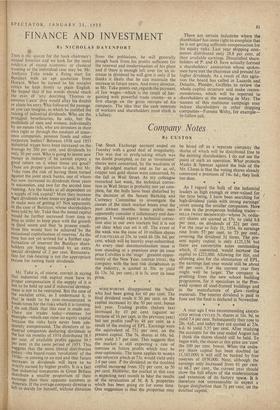SPECTATOR, JANUARY 21, 1955
FINANCE AND INVESTMENT
By NICHOLAS DAVENPORT Tuts is the season for the bank chairmen's annual homilies and we look for the usual evidext of sound economic or classical training as the individual case may be. Mr. Anthony Tuke made a flying start for Barclays with an apt quotation from Horace. When he turned to his socialist critics he kept firmly to plain English. He hoped that if his words should reach the eyes of 'any doubting Thomas or
Mr. Tuke is, of course, correct in saying that industrial risk capital must have its proper compensation if the supply of it is not to be held up and if industrial develop- ment is not to be restricted. But the case of the socialist critic, as I understand it, is that io tends to be over-remunerated in boom times for the risks which it is running. I do not. think that this case is made out. There are trades today-cinemas for example-which can raise no equity capital because the risks have never been ade- quately compensated. The directors of in- dustrial companies declaring dividends in the last six months of 1954 distributed 38.5 Per cent. of available profits against 39.5 Per cent. in the same period of 1953. This suggests that the more liberal distribution Policy-the board-room 'revolution' of the 1950s-is coming to an end and that future increases in dividends will have to be strictly earned by higher profits. It is a fact that industrial companies in Great Britain distribute a smaller proportion of their earnings than their opposite numbers in America. If the average company director is left to decide for himself, without dictation . envious Casca' they would allay his doubts or abate his envy. This followed the passage, as you can imagine, in which he justified the raising of industrial dividends. Who are the principal beneficiaries, he asks, but the multitude of men and women, individually by no means rich, who are investors in their own right or through the medium of insur- ance companies, pension funds and other corporate bodies? Between 1938 and 1953 industrial wages have been increased on the average by 200 per cent. and dividends by only 50 per cent. Who is going to invest new Money in industry if he cannot expect a good return on it when times are good? These are proper questions to ask, but Mr. Tuke runs the risk of having them turned against the joint stock banks, one of whom has now increased its dividends three years in succession, and two for the second time running. Are the banks at all dependent on a supply of risk capital? Must they increase their dividends when times are good in order to make sure of getting it? Not apparently in the case of Barclays. whose shareholders were told by Mr. Tuke that the issued capital would be further increased from time to time in order to keep pace with the growth in fixed assets and that in present condi- tions this would best be achieved' by the occasional capitalisation of reserves.' As the time has not yet arrived for a further cap- italisation of reserves the Barclays share- holders are being consoled by an extra special dividend of 2 per cent. Remunera- tion for risk-bearing is not the appropriate excuse for raising bank dividends.
from the • politicians, he will generally plough back from his profits sufficient for the renewal and modernisation of his plant and if there is enough left over for an in- crease in dividend he will give it only if he thinks it likely that he can maintain the increase in future years. And every director, as Mr. Tuke points out, regards the payment of fair wages-which is the result of bar- gaining with powerful trade unions-as a first charge on the gross receipts of his company. The idea that the cash interests of workers and shareholders must clash is a fallacy. There are certain industries where the shareholder has some right to complain that he is not getting sufficient compensation for his equity risks. Last year shipping com- panies distributed only 28.8 per cent. of their available earnings. Dissatisfied share- holders of P. and 0. have actually' formed a. shareholders' association whose spokes- men have met the chairman and pressed for higher dividends. As a result of this agita- tion the board has called in Lazards and Deloitte, Plender, Griffiths to review the whole capital structure and make recom- mendations, which will be reported to shareholders at the meeting in May. The success of this mutinous campaign may induce shareholders in other shipping .companies-Furness Withy, for example- to follow suit.


































 Previous page
Previous page